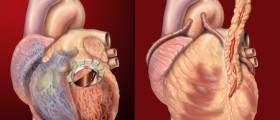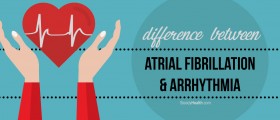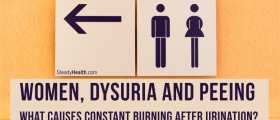Heart palpitations are a common symptom of menopause, but they can also be one of the symptoms that a woman experiences just before entering menopause, in the so-called perimenopause.
How do Heart Palpitations Manifest Themselves?
Heart palpitations are the physical sensations of irregularities in the beating of the heart. While they don’t necessarily have to be a symptom of menopause, they are most often linked to it, and with good reason. The thing is that a woman rarely experiences menopause without experiencing heart palpitations.
Heart palpitations do not have a fairly regular way of manifesting themselves, as they occur from out of nowhere every now and then, seemingly unprovoked by anything. However, one might expect them to follow the hot flashes, as that is when they mostly appear in menopause.

Why Does Menopause Cause Heart Palpitations?
As pretty much all of the symptoms of menopause, heart palpitations are caused by hormonal changes and irregularities. These changes are always sudden and intense, and they provoke chaos in the entire body, but the likely manifestations are sweating and irregularities in the beating of the heart. Of course, the palpitations do not last throughout the whole process of menopause, because the hormones settle down after only a couple of months.
Another menopause-related issue that may lead to heart palpitations is the therapy used to restore the balance in the hormones. For the very same reasons that the palpitations occur due to the hormonal changes caused by menopause, heart palpitations manifest themselves here as well, but it’s just until the body is used to the process.
- Many menopause symptom checklists include palpitations (e.g. rapid, irregular, and/or exaggerated heartbeats), and research suggests palpitations are relatively common. Up to 42% of perimenopausal women and 54% of postmenopausal women report having palpitations. However, although 44%–87% of women aged 40–59?years believed their palpitations required treatment, a systematic review found no Level 1 evidence for managing menopause palpitations.
- The review followed the Preferred Reporting Items for Systematic reviews and Meta-Analyses extension for Scoping Reviews (PRISMA-ScR). Authors included English-language, full-length, peer-reviewed, cross-sectional research articles on palpitations in menopausal women published through December 18, 2021, from PubMed, Cumulative Index to Nursing and Allied Health Literature (CINAHL), and PsycINFO searches.
- Articles were diverse in region of origin, sample sizes, and variables assessed in relationship to palpitations. Evidence for any one variable was sparse. Likely correlates of palpitations included race/ethnicity, lower physical activity, worse vasomotor symptoms (VMSs), worse sleep, and worse quality of life.
- Unlikely correlates included age, employment, education, marital status, socioeconomic status, comorbidities, body mass index, and sexual difficulties. Unclear correlates due to equivocal evidence were menopausal status, smoking, and depression. Unclear correlates due to insufficient evidence (less than three articles) included all of the assessed biomarkers, anxiety, and stress.
What Are Some Other Causes of Heart Palpitations?
Naturally, menopause is not the only possible reason for the occurrence of heart palpitations. Even if they occur during menopause, it may not be their cause at all. That’s why it’s highly recommended to consult a doctor about these symptoms to make sure that nothing that might require treatment is the matter because if it is, it should be treated while there are no further complications and consequences.
Anyway, the most frequent cause of heart palpitations besides menopause is the intake of many unhealthy stimulants, such as caffeine, alcohol, nicotine, and diet pills, to name a few. When the intake of these substances is fairly high, they can leave the heart in a sort of confusion which can cause it to beat uncontrollably.
Finally, conditions like anemia, hypoglycemia, and various kinds of thyroid disruptions are all likely to be the reason for heart palpitations.

















Your thoughts on this
Loading...